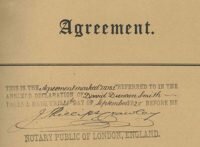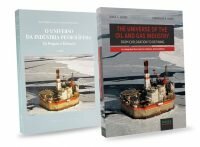… bringing knowledge and history into the future of energy.
THE FOUNDER
Prior to the First World War, Calouste Gulbenkian was the entrepreneur behind the formation of the Turkish Petroleum Company which, after many vicissitudes, became the Iraq Petroleum Company in which he held a 5% interest (and as a consequence, became known as “Mr. Five Percent”).
The contract between Royal Dutch Shell, Anglo Persian (now BP), Compagnie Française des Pétroles (now TOTAL), Near East Development Company (now Exxon/Mobil) and Calouste Gulbenkian was signed in July 1928.

At the same time, the partners undertook to work together within the boundaries of the former Ottoman Empire – the “Red Line Agreement” which had a huge influence on the future development of the oil reserves in the Middle East and led directly to the Partex Oil and Gas Group’s present interests in the United Arab Emirates and the Sultanate of Oman.
Calouste Gulbenkian was, above all, an exceptional negotiator. His influence extended beyond the Middle East oil industry to the involvement in the industry in many countries including Venezuela and Mexico, as a result of his contacts with other pioneers in the industry and experience as an advisor to various governments.
There is no doubt, however, that his greatest contribution was in the development of the Iraq Petroleum Company which he always considered as his creation.
In addition to his passion for the oil industry, his other consuming interest was his art collection. Calouste Gulbenkian revealed his passion for art at an early age. Above all, it was the beauty of the objects that was appealing to him.
Throughout his life, he used his knowledge of art, his negotiating mastery and his wealth to build one of the greatest collections to have ever been assembled by an individual, an eclectic and unique collection that was influenced by his travels and his personal taste, which sometimes involved lengthy and complex negotiations with the leading experts and specialist dealers. His collection totals over 6.000 works of art which range in period from antiquity until the early twentieth century. His attachment to the works of art he acquired was so strong, that he considered them “his“ children.
Calouste Gulbenkian was a generous philanthropist who always strove to help the less fortunate. He was particularly concerned with protecting Armenian communities.
Calouste Gulbenkian spent the final years of his life in Lisbon, Portugal, where he died in 1955. In his will, he left his oil interests and his art collection to a foundation, the Calouste Gulbenkian Foundation, which was to be based in Lisbon.



